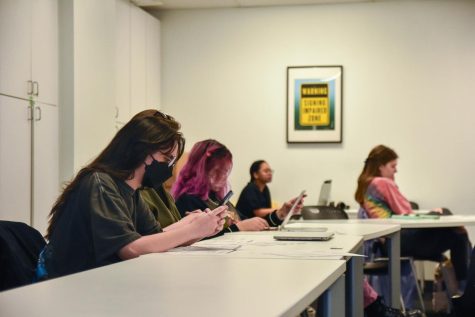COVID Task Force plans pre-pandemic structured return for fall semester
May 1, 2023

DEI ISSUE
For nearly three years after the COVID-19 pandemic started in spring 2020, Columbia’s Campus Reopening Task Force met weekly to get expert medical advice, review data and set the safety parameters at the college.
This spring, in a sign of the decreased impact the pandemic is having at the college, the Task Force is not meeting as often.
Chicago’s COVID-19 risk level remains low and has been since February. The college lifted its mask mandate for the classroom — in place for nearly three years — when that happened.
The Task Force is made up of administrators, full-time faculty and representatives of the staff and part-time faculty unions.
When students return in the fall, the college likely will have no COVID-19 restrictions in place at all, said Matthew Rillie, coordinator of student support and engagement at Student Diversity and Inclusion and a member of the Task Force.
“I think we really are gonna see campus kind of return to the structure that it was before COVID,” Rillie said.
“What we’re really trying to be mindful of is, we have learned a lot about how to have more accessible, inclusive work in the past two years, and we want to bring that with us so that campus will look different than it ever has,” they said.
Rillie said that they think that the Task Force will not continue to meet as frequently starting next semester. Still, they said that the Task Force is evolving to address better address the impact of COVID-19.
“How do we really approach educating creatives with everything that we’ve just experienced collectively?” Rillie said. “I think that’s going to take restructuring. It’s going to take more people. It should really be conversations with as many faculty, staff, administration and students as it can be.”
Results from a Faculty Senate survey taken in February shows that out of 135 professors who responded, 29 did not feel safer when masking, 52 felt somewhat safer and 49 felt significantly safer.
Tinia Montford, English and Creative Writing graduate student instructor, said that she was satisfied with the decisions made by the Campus Reopening Task Force to keep campus safe.
“The institution had complete transparency with the protocols for testing and masks in the classrooms and meeting places,” Montford said. “The college kept faculty and staff abreast of the total cases on campus and followed guidelines from the CDC’s determination of Chicago and Cook County’s COVID-19 risk level.”
Montford tested positive for COVID-19 just a few weeks after the mask mandate was lifted and said in an email to the Chronicle that she felt supported by her department, as she is immunocompromised.
“Those in charge were immediately resourceful in suggesting ways to reconfigure class and assignments, with those willing to step into the classroom until I fully recovered,” Montford said.
Montford said that she worked with students faced with positive test results to provide as many accommodations as needed. “A student’s health comes before a grade, and if I could do anything to help my students recover soundly and quickly, I did.” Montford said.
Frankie Buente, a sophomore film and television major, said they felt supported by their professors when they tested positive for COVID-19 but wished they received more understanding throughout their recovery process.
“My professors were very forgiving during the COVID thing; I was like, ‘I don’t want to do assignments, I have such brain fog.’ But then after that, there was much less forgiveness. It was pretty intense,” said Buente.
Robert Lawson, a sophomore film and television major, said he wished the Health Center could contact instructors on a student’s behalf, because “when you’re sick, your thought is more about taking care of the sickness than it is sending out that email.”
Gus Costanzo, a first-year acting major, hopes for more quarantine options on campus, as well as more awareness about when students have come in contact with COVID-19 through classmates.
Max Grove, a first-year journalism major, said that he has felt comfortable with the guidelines set in place this semester and feels as though things should stay the same unless cases spike.
Despite the lift of mandates and “more routine healthcare,” COVID-19 is still present and is far from over, Rillie said.
Rillie said that COVID-19 testing options will be based on student’s insurance rather than being readily available on campus and that quarantine options will be “an approach of individual resources.”
“COVID impacts so many people’s lives daily right now. It’s evolved our work; I think we’ve gone beyond the point of a mask mandate on campus of course, but we still need to still discuss that COVID is still very much here,” they said.







